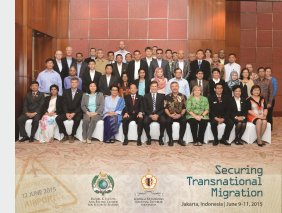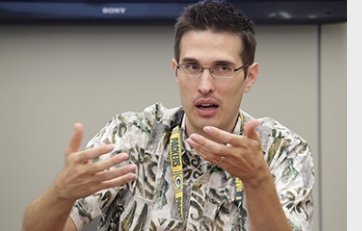150 Fellows complete APOC 15-2
|
Gaining an expanded perception of regional security issues, 150 professionals completed Asia-Pacific Orientation Course 15-2 June 26 at the Asia-Pacific Center for Security Studies. Attendees gained an analysis of factors impacting regional security, specifically looking at factors within multiple sub-regions such as Oceania, Southeast Asia, Northeast Asia and South Asia. "Given the size and complexity of the region, and its increasing interconnectedness, it’s critical that security practitioners in this domain are able to understand current and future security challenges,” said APOC course manager Cmdr. Alan Chace. This is especially true, he said, in light of the region's ever evolving security environment. APOC is a five-day course designed to provide an overview of regional trends in the socio-economic, political, defense, health and environmental arenas that drive the Asia-Pacific security environment. To read more, click here.
|
|
|
APCSS conducts transnational migration workshop
|
The interconnected global economy, with its tremendous imbalances in workforce demographics and development levels, generates millions of migrants. This situation poses unique security challenges for both origin and destination countries in the Asia-Pacific region. To address these challenges and associated cooperation opportunities, 42 people from 10 origin and destination nations, and three international organizations gathered for the workshop “Securing Transnational Migration in the Asia-Pacific Region” June 9 - 11 in Jakarta, Indonesia. To read more, click here.
|

|
|
|
TSC promotes strategic-level collaboration
|
Honing their abilities to cooperate on major international crises, 24 military and civilian security practitioners from 23 locations completed the Transnational Security Cooperation course (TSC 15-1) today at the Asia-Pacific Center for Security Studies. APCSS faculty challenged attending Fellows to collaborate on responses to an Ebola outbreak and cyber attacks against vital infrastructure in the Asia-Pacific region. Teams analyzed impacts on critical entities, such as economic, public health and governance sectors, and formed and documented response measures and potential solutions. TSC is a senior executive course designed for military general officers and civilian equivalents in the security sector. Fellows include leaders in policing, emergency response, foreign relations, economic development and civil government. The latest iteration of the course began June 1. To read more, click here.
|
|
|
Dr. Jeffrey Hornung completes stay with APCSS
|
 |
The Asia-Pacific Center for Security Studies bid farewell to Dr. Jeffrey Hornung June 19. He served as an associate professor with the Center the last five years and has helped enhance the leadership and problem solving skills of security practitioners throughout the Asia-Pacific region. Hornung has taken a research fellow position at the Sasakawa Peace Foundation USA in Washington, D.C. To read more, click here.
|
|
|
|
|
Comprehensive Crisis Management Course 15-1
July 23 - Aug. 25
Ensuring Security, Stability, and International Law in a Changing Arctic
July 13 - 16
Security Sector Development Dialogue, Papua New Guinea
Aug. 17 - 21
|
|
June 3: AMB Ted Osius, U.S. Ambassador to Vietnam.
June 26: DASD Amy Searight, U.S. Deputy Assistant Secretary of Defense for South and Southeast Asia
June 26: AS Nisha Biswal, U.S. Assistant Secretary of State, South and Central Asian Affairs
June 26: DAS Atul Keshap, U.S. Deputy Assistant Secretary of State, South Asia
|
|
Our latest edition of Currents magazine, published 30 June 2015, is available here.
|
|
If you have a new email please update your subscription to ensure you are getting the latest APCSS updates. Mahalo.
If you have any questions please contact the editor at hallj@apcss.org
|
|
|